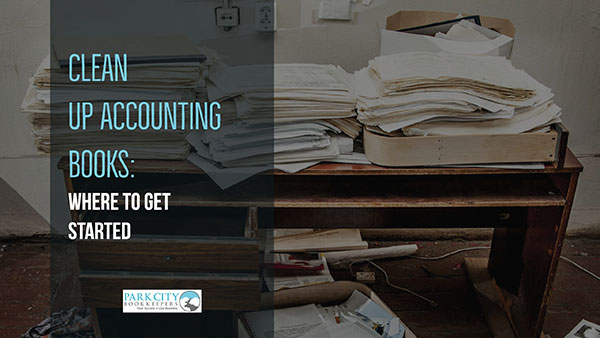To maintain records regularly and efficiently, every business needs to have a proper accounting system in place. However, most business owners are typically not trained in accounting, and small businesses do not generally keep dedicated full-time bookkeepers. As a result, costly mistakes may ensue, which can leave accounting records a mess – i.e., generated reports may not accurately reflect the company’s financial condition, transactions might not be categorized into proper income and expense accounts, source documents for transactions may be missing, it may be impossible to reconcile existing records, etc.
Fortunately, with the right kind of approach, you can effectively clean up accounting books and get your business back on track – here are some tips to help you reorganize and get things under control again:
#1. Determine whether you have a problem
Some business owners may be completely unaware that they have a problem – this is generally when the issue is in its early stages, and the effects of messy books have yet to get noticed. Others, however, may find themselves giving up, finding the mess impossibly difficult to handle. They may feel it is too hard/expensive to clean up accounting books, and may not know where to begin.
However, it is important to realize that if your set-up is costing you money and time (particularly when it is time to calculate taxes), causing you stress (owing to the chance of IRS penalties and fines), limiting the success of your business (by preventing you from gauging business performance and making informed decisions) and putting you/your business at risk (owing to inaccurate reporting of revenue or mishandling of funds), you clearly have a problem and need help in order to clean up your accounting books.
#2. Spot the problem area(s)
The second step to clean up accounting books is to identify the problem area. You can start by asking these nine simple questions to help you figure out where the problems lie:
- Do retained earnings match your tax returns? If not, there is probably a problem somewhere, and you need help.
- Are bank statements reconciled? If your cash and bank statements cannot be reconciled or do not match, it is a strong sign that your books are not in order.
- Are fixed assets appropriately capitalized? Fixed asset items such as lease payments should always be properly capitalized.
- Are assets accurately recorded? If your records are unchanging over a long period of time, it may indicate a reporting issue.
- Are credit cards reconciled?
- Are financial obligations booked properly?
- Do unrelated party loans such as lines of credit and bank loans match with statements? And is interest booked properly?
- If you own more than one business and loan money from one business to another, do both companies having matching records?
- Do you have any negative assets or negative liabilities?
The best way to go about this, however, is to perform an audit which will uncover all unnoticed issues and problem areas. You may need to hire a professional accountant to do this, particularly if you do not have the required experience for spotting and fixing accounting issues.
#3. Take proactive steps to clean up the mess
Once you have acknowledged that there is a problem and spotted the areas that need fixing, the final step is to take practical steps to sort out the issues.
To clean up accounting books, you will need to start by setting up a proper accounting system (which complements your particular business), equipping it with a suitable accounting software and integrating your bank accounts. You will then need to create a chart of accounts where all transactions can be recorded appropriately.
The cleanup process can be painstakingly long since you will need to track past transactions, record them properly and reconcile them, but the advantages of properly maintained books far outweigh any inconveniences.
Finally, if you are going to be handling your own books, you will need to ensure that you remain disciplined and reconcile transactions on a regular basis – this way, you will stay up-to-date on your financials, make timely and informed decisions for your business, generate accurate financial reports as and when required, and make easy work of taxes.
While financial illiteracy is not a crime, it is important to get help when you need it, before the situation worsens. One of the smartest and simplest ways to clean up accounting books is hiring a bookkeeping firm. You can save time, effort, and even money, since paying a professional will ensure that you avoid losses, fines, penalties and additional expenses in the long term.
At Park City Bookkeepers, we offer a full range of bookkeeping services and bookkeeping cleanup services to help you sort out accounting issues and keep your books in order on an ongoing basis.

